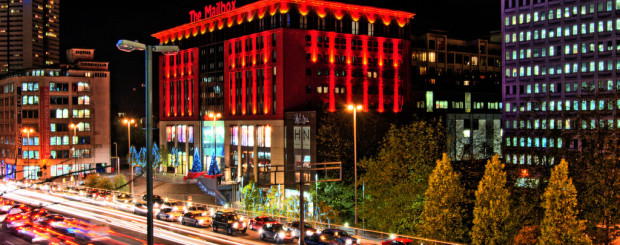London vs Birmingham
When you think of the cities of the UK, London is always the first to spring to mind. But there are some other fantastic cities in the country, one of which is the Midlands city of Birmingham.
Now being dubbed as ‘Britain’s second city’, Birmingham has seen a massive influx of Londoners moving here, thanks to a superb city revival that’s seen big businesses make this their home, far cheaper property prices and somewhat of an economic boom for the city.
So let’s take a balanced look at the two cities, taking statistics from trusted data sources such as Numbeo and Expatistan, who provide real time data on various aspects such as entertainment, food, housing, clothes and transport.
Birmingham has an appreciably lower population density: In fact, people in Birmingham live in conditions that are 39.25% less cramped than those in London. The figures show that in Birmingham there are currently 3739 people per square km, against London’s 5206 in the same area.
Housing is way cheaper in Birmingham: For example, if you were to purchase an apartment in the centre of London, you’d expect to pay £15,869.99 per square metre (£8.242.55 outside the centre). But in Birmingham, the same living space would cost a mere £1,900 (£1,166.67 outside the centre of town) – an incredible 88% lower in price.
Renting is also way cheaper in Birmingham, with a 1 bedroom apartment costing around 60% less in the Midlands city and 70% less for a 3 bed place.
Real time rental and purchase prices of property in both cities can be found on websites such as Right Move and Zoopla.
Birmingham has cheaper public transport: Yep, by over 50%. When you look at the average monthly cost of using public transport in London, it comes in at around £130. Whereas the same in Birmingham will set you back £57.
Food and groceries are cheaper in Birmingham: In general, that is. You can expect to pay around 5-25% less on your weekly grocery shop in Birmingham as opposed to London. And it’s also cheaper to eat out at restaurants, by around 10-15%.
OK, so we get that Birmingham offers a substantially cheaper living option to London. But it’s not all about the money, we know that. After all, what’s the point in moving to a cheaper area if there are no great employment opportunities available!
London, after all, is THE place to be for those looking to advance their career.
So why should Birmingham have any reason to entice you to move there. Well, the rejuvenation and popularity of Birmingham (not to mention the lower prices) has not escaped the notice of big business.
As of 2015, banking group, HSBC have announced that they are to move their head office for retail and business lending from London to Birmingham. Deutsche Bank is another player that’s already expanded operations in the city, and PwC have ranked the city in 6th place in Europe for investment, beating London hands down…
Better weather in London: Simply because the city is further south. It has a higher average temperature than Birmingham and far less rain (by 71 days per year, which has to be said, is an awful lot.)
Lower unemployment rate in London: versus Birmingham, by around 1.6%
Higher salaries in London: With the average monthly disposable salary (after tax) coming in at £1,956.44 as opposed to Birmingham’s £1,547.12 – a difference of almost 21%.
Location and transport options are also something to be taken into consideration. London is in the South East of the UK, whereas Birmingham is in the Midlands. Each has their own advantages, with the location of London meaning that there are great places in the South of the country within easy reach, such as Brighton, and the delightful green spaces of the Home Counties of Buckinghamshire, Hertfordshire and Berkshire.
Birmingham, being that much further north, offers the chance to get to historic cities such as York, Chester and Manchester for a day out.
Airports: Looking at the opportunity to fly from either of the cities, on first glance it appears that London is far superior to its Midland’s cousin. With London Heathrow, City, London Gatwick, London Luton and London Stanstead to choose from, how could Birmingham compete with its lowly single option?
But hold on a moment… Because when you look at London’s airports, there’s really only three that can be considered to really be ‘in London’. And that’s Heathrow, City and Gatwick – and Gatwick only hits the spot because it’s so easy to get to from the centre of London using the Gatwick Express train from Victoria Station. Getting to Stanstead or Luton means taking a bus, and therefore being at the mercy of the traffic on the busy M1, M25 and M11 motorways.
Now, Birmingham Airport offers a great range of international flights, and although it may be small, a relatively easy passage through from start to finish. And don’t forget that East Midlands Airport is only 40 miles away from the city (easily comparable to how far away Stanstead, Luton and Gatwick are from London).
Scenery and waterways: There’s no denying that London is superbly blessed for waterways, with the majestic River Thames dominating the landscape. But Birmingham has an amazing network of canals – in fact, the city boasts more waterways than Venice!
Both cities have some great parks, including Kings Heath and Cannon Hill in Birmingham, and the famous Hyde Park and St James’s in London.
In conclusion
So, when comparing the two cities there are definite pros and cons to living in each. The cost of living is definitely more expensive in London, and this is not completely offset by the average higher wages here.
However, the history, variety and sheer size of London is something that is incomparable anywhere in the UK, let alone Birmingham.
But the fact that global business is recognising the draw of Birmingham over London means that career opportunities will surely continue to rise in the Midlands. The city itself has undergone massive rejuvenation in the past few years, and the exodus of tens of thousands of Londoner’s per year to Birmingham is very telling.
As to which city is better, well that all comes down to personal choice. They both have very compelling reasons to choose to live there, and that is only a decision that can be made by you.








